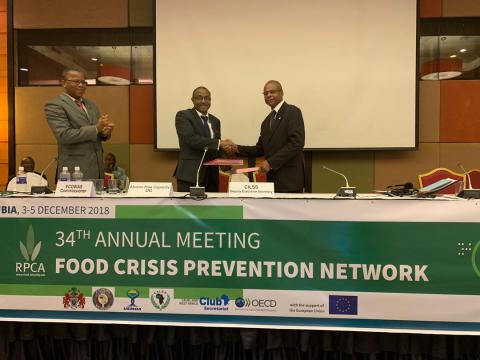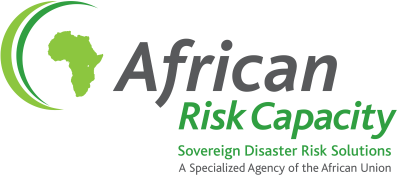
Banjul, The Gambia, 3 December 2018 – The African Risk Capacity Agency (ARC) and AGRHYMET signed a Memorandum of Understanding to formalize technical collaboration and intensify joint efforts to improve food security in West Africa.
The two organisations are advancing their mandates to address climate-induced food insecurity in West Africa and the Sahel by partnering to develop risk models and innovative financial mechanisms to address regional climate hazards such as drought and river floods.
Combining AGRHYMET’s regional knowledge with ARC’s continental experience, the partnership aims to leverage the strengths of each organisation to reinforce regional capacity building programmes in risk modeling and early warning systems.
Over the past year, ARC and AGRHYMET have collaborated to confront drought risk in West African nations, including reviewing drought risk models from 8 countries in the Africa RiskView Customisation Review Committee. The Memorandum of Understanding formalizes their collaboration and sets the course for closer efforts in improving food security in the region through research and data-informed responses.
“To reduce climate-related food insecurity in West Africa, we must understand the risks we face in the region,” said Mr. Mohamed Beavogui, Director General of African Risk Capacity Agency. “Our partnership with AGRHYMET builds on African expertise to identify these risks and inform early action that will protect farmers and the people they feed.”
Signed on the side lines of the RCPA meeting at OECD conference centre and leading up to the UNFCCC COP24, the partnership follows the Memorandum of Understanding between ARC and ECOWAS signed in 2017. ARC’s partnership with AGRHYMET realises the technical collaboration that ARC and ECOWAS committed to in the agreement signed in the run-up to COP23.
ARC has a strong history in West Africa – of the 15 ECOWAS Member States, 14 are also ARC Member States. 11 out of the 13 countries that AGRHYMET serves are participating in the ARC Capacity Building Programme, and six have joined ARC’s risk pools to transfer drought risk and access disaster risk financing. Three of these countries – Senegal, Mauritania, Niger – have collectively received US $28.7 million to fund emergency responses following drought events.





